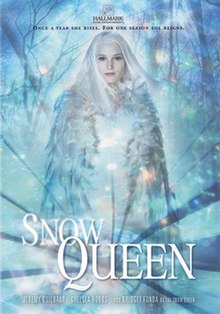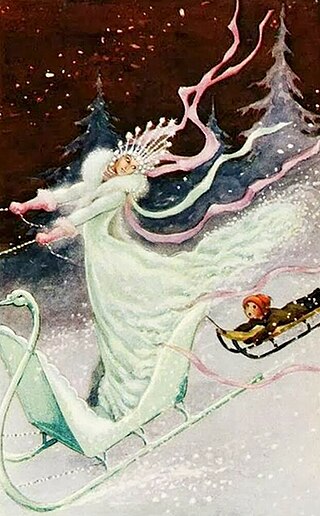
"The Snow Queen" is an original fairy tale by Danish author Hans Christian Andersen. It was first published 21 December 1844 in New Fairy Tales. First Volume. Second Collection. The story centers on the struggle between good and evil as experienced by Gerda and her friend, Kai.

"Snow White" is a German fairy tale, first written down in the early 19th century. The Brothers Grimm published it in 1812 in the first edition of their collection Grimms' Fairy Tales, numbered as Tale 53. The original German title was Sneewittchen; the modern spelling is Schneewittchen. The Grimms completed their final revision of the story in 1854, which can be found in the 1857 version of Grimms' Fairy Tales.
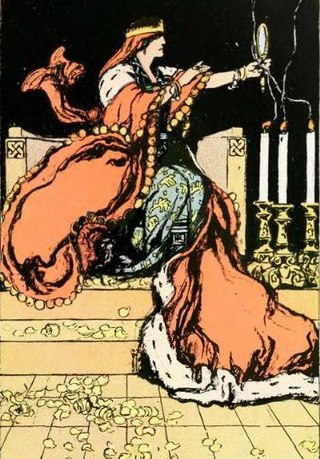
The Evil Queen, also called the Wicked Queen or just the Queen, is a fictional character and the main antagonist of "Snow White", a German fairy tale recorded by the Brothers Grimm; similar stories exist worldwide. Other versions of the Queen appear in subsequent adaptations and continuations of the fairy tale, including novels and films. One particularly notable version is Disney's depiction, sometimes known as Queen Grimhilde. The character has also become an archetype that inspired unrelated works.

The Snow Queen is an anime television series based on the 1844 children's story of the same name by Hans Christian Andersen. It is directed by Osamu Dezaki and animated by TMS Entertainment. The first episode aired on May 22, 2005, on Japan's NHK network.
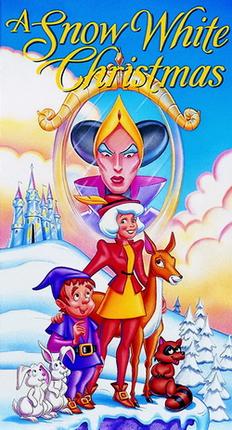
A Snow White Christmas is a Christmas animated television special produced by Filmation and telecast December 19, 1980, on CBS. The special is a sequel to the fairy tale "Snow White", unrelated to Filmation's other sequel to "Snow White" titled Happily Ever After (1989), which ignores everything from this film.
Chelsea Hobbs is a Canadian actress. She is known for roles such as Gerda in the 2002 television film Snow Queen and Emily Kmetko in the ABC Family teen drama Make It or Break It.

The Snow Queen is a 1957 Soviet animated musical fantasy film directed by Lev Atamanov. It is the ninth full-length animated production by Soyuzmultfilm and is based on the 1844 fable “The Snow Queen” by Hans Christian Andersen. The film is one of the earliest cinematic adaptations of the Scandinavian Danish fable since its publication in New Fairy Tales. First Volume. Second Collection.

The Snow Queen is a 2005 BBC television film commissioned by Michael Carrington that is based on the 1844 Hans Christian Andersen fairytale of The Snow Queen. Directed by Julian Gibbs, it stars Juliet Stevenson as Gerda's mother and the voice of Patrick Stewart as the raven.

Snow White is a fictional character and a main character from Walt Disney Productions' first animated feature film Snow White and the Seven Dwarfs (1937). She was originally voiced by Adriana Caselotti. The character of Snow White was derived from a fairy tale known from many countries in Europe with the best-known version being the 1812 tale collected by the Brothers Grimm.
The Snow Queen is a chamber opera in six scenes and a prologue by Matthew King. The libretto, by Andrew McKinnon, is based on the original 1844 allegorical fairy tale by Hans Christian Andersen. The opera was composed in 1992 for the British soprano Jane Manning who sang the title role in the first performance with Pal Rullestad (tenor) and Tracy Chadwell (soprano) in supporting roles. The work also has significant roles for two young singers as Gerda and Kay, the heroic children in the story and a chorus of treble voices. The work is scored for a small ensemble of eight players with conductor: string trio, flute/piccolo/alto flute, clarinet/bass clarinet, piano/celesta and percussion. The pianist also has to play a melodian. At one point, the conductor is required to play a French horn. The wide-ranging musical narrative involves a plethora of musical styles. A review of the first performance described King as being "like a bright Hollywood composer with a sense of humour" and, after a subsequent performance at the Queen Elizabeth Hall in London, another reviewer suggested that the opera contained '"music of distinctive beauty with disarming theatre sense.'"
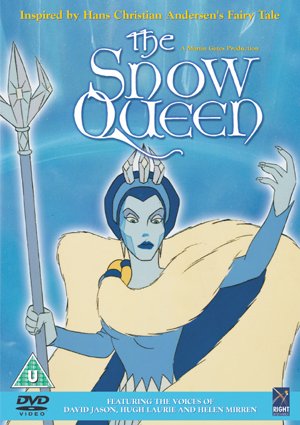
The Snow Queen is a 1995 British animated film directed by Martin Gates and inspired by Hans Christian Andersen's 1844 fairy tale The Snow Queen, featuring Helen Mirren in the titular role. A direct sequel, The Snow Queen's Revenge, was released the following year.

The Land of Stories is a series of children's fiction, adventure and fantasy books written by American author, actor and singer Chris Colfer. The first book, The Wishing Spell, was released on July 17, 2012. The sixth book was published in July 2017. During a live video chat, Colfer revealed plans for a prequel series, which have now been published. The books are described by Colfer as a "modern-day fairy tale", following twins Alex and Conner Bailey as they fall from the real world into a world full of fairy tales they have only ever read about before and discovering there is more to this world than meets the eye.
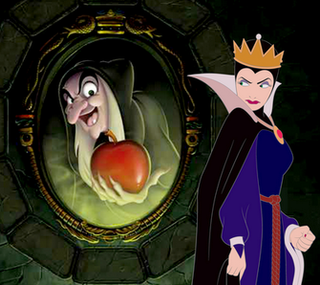
The Evil Queen, also known as the Wicked Queen, Queen Grimhilde, or just the Queen, is a fictional character who appears as the main antagonist in Walt Disney Productions' first animated feature film Snow White and the Seven Dwarfs (1937) and remains a villain character in their extended Snow White franchise. She is based on the Evil Queen character from the 1812 German fairy tale "Snow White".

The Snow Queen is a 2012 Russian 3D computer-animated fantasy adventure family film written by Vadim Sveshnikov and directed by Vladlen Barbe and Maxim Sveshnikov. The Snow Queen was produced by Wizart Animation and released by Bazelevs. InlayFilm acted as co-production studio. The film is a remake of the 1844 story of the same name by Hans Christian Andersen. The film was produced by Timur Bekmambetov, Alexander Ligaiy, Yuri Moskvin, Sergey Rapoport and Olga Sinelshchikova.
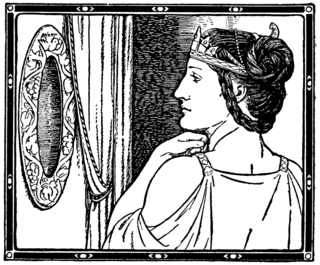
The Magic Mirror is a mystical object that is featured in the story of Snow White, depicted as either a hand mirror or a wall-mounted mirror.
"The Snow Queen" is the seventh episode of the fourth season of the American fantasy drama series Once Upon a Time, which aired on November 9, 2014.

The Snow Queen 2: The Snow King and released in Russia as, is a 2014 Russian 3D computer-animated fantasy comedy family film that is produced by animation studio Wizart Animation. Written by Aleksey Tsitsilin, Vladimir Nikolaev, Roman Nepomnyashchiy, Aleksey Zamyslov and directed by Aleksey Tsitsilin, the film is the sequel to the 2012 animated film The Snow Queen.
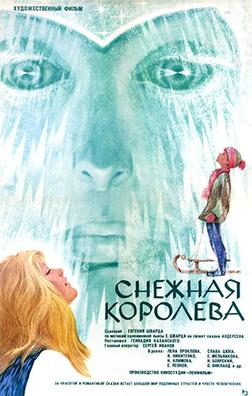
The Snow Queen is a Soviet 1967 fantasy film, directed by Gennadi Kazansky and based on the eponymous 1844 fairy tale by Hans Christian Andersen.

The Snow Queen is an opera by Hans Abrahamsen and was commissioned by the Royal Danish Opera. The world premiere in Danish took place on 13 October 2019 in Copenhagen. On 21 December 2019 the English version was premiered at the Bavarian State Opera in Munich. The work is based on the fairy tale "The Snow Queen" by Hans Christian Andersen and the libretto is by Hans Abrahamsen and Henrik Engelbrecht.

The Snow Queen: Mirrorlands is a 2018 Russian 3D computer-animated fantasy adventure family film written by Andrey Korenkov, Robert Lence and directed by Robert Lence and Aleksey Tsitsilin. Wizart Animation took charge of design while Boris Mashkovtsev, Yuri Moskvin, Vladimir Nikolaev, Pavel Stepanov and Vadim Vereshchagin produced the film. The film stars the voices of Lina Ivanova as Gerda and Nikolay Bystrov, Filipp Lebedev, Lyasan Utiasheva, Vladimir Zaystev, Irina Bezrukova, Nadezhda Angarskaya, Vsevolod Kuznetsov, Olga Zubkova, Nikita Prozorovsky, Anton Eldarov, Mikhail Yuryevich Tikhonov in supporting roles.
